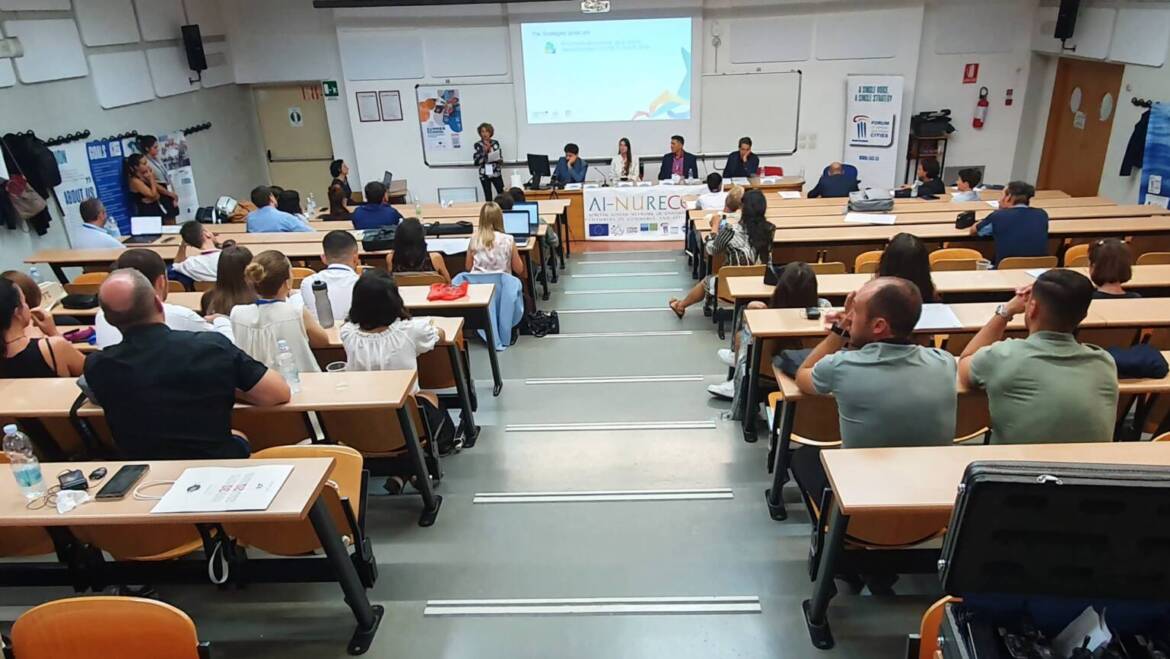On september 16th, in Ancona, the AI-NURECC Plus conference on “Sustainable Tourism in the Adriatic-Ionian region” has been held. The conference was the occasion to discuss about the current challenges the tourism sector is facing due to the health and climate crises and to reflect on how to turn them into opportunities and into assets for recovery and local development. By offering a picture of the current solutions for conscious tourism, also thanks to the outputs coming from the UniAdrion Summer School and the Fair, the conference delineated how to further implement sustainable tourism development models.
The conference was in fact preceded by a Fair, in which excellent examples of “sustainable tourism providers” (Risi Albania, Funky Tours, Ecobnb, City of Igoumenitsa, Ancona Tourism, Mustseedonia and Balkan Green, Serbia undiscovered, Walk of Peace, Erasums Student Network) presented their initiatives to reduce the negative impact of tourism and enhance the positive impact in rural areas and off-the-beaten track, by offering environmentally conscious holiday solutions.
The conference was also the closure of 2 weeks of a Summer School, held by Uniadrion, on the same topic.
Welcome Greetings
The conference, moderated by Valerio TEMPERINI, Professor at Marche Polytechnic University – Department of Management, opened with the welcome greetings held by:
- Gian Luca GREGORI, Rector of the Marche Polytechnic University: he pointed out as the creation of a network such as Uniadrion, Faic and the other partners is fundamental for the cooperation and for the EU integration. This is why the Marche Polytechnic University supports this initiatives of cooperation between Universities from all the Adriatic-Ionian region and activities such the Summer School on Sustainable Tourism, organized by Uniadrion, in the framework of the AI-NURECC Plus project.
- Ioannis LOLOS, Mayor of Igoumenitsa, FAIC President: after thanking for the hospitality and bringing the greetings of the Secretary General of FAIC, Ida Simonella, he said: “Sustainable tourism is a vital part of regional and macro-regional development strategies. In this regard culture is both a driver and an enabler of sustainable development. Collaboration with us stakeholders, regulators, workers and visitors is the key to the long-term success of Tourism“;
- Andrea PERNA, Full Professor at Marche Polytechnic University, UniAdrion Secretary General: “Uniadrion and the other partners of AI-NURECC Plus follow the EUSAIR strategy and we try to apply the pillars of that strategy. We have put together sustainability and tourism from a growth perspective for our areas, from an academic perspective as well as from a more business perspective. And through the summer school we really hope to have left to the students some kind of inspiration or tool-kit you might bring back home“.
- Stavros KALOGNOMOS, Executive Secretary of the Balkan and Black Sea Commission (BBSC),Conference of Peripheral Maritime Regions (CPMR) – AI-NURECC PLUS Coordinator: “The overall idea of this initiative that brings together five key stakeholders from the Adriatic and Ionian reagion is to increase to raise awareness and decrease appropriation of the objectives of the Adriatic and ionian strategy of the EU. Sustainable tourism is one of the key priorities of AINURECC Plus together with circular economy and the culture and creative industries. Youth is a transversal priority of AINURECC Plus and there is no better place than the university to bring youth together with us and exchange with them and learn about the fresh ideas because no strategy can be sustainable without the involvement of young people. We’ll make sure that we’ll capitalize on the results of today’s high-level conferences sustainable tourism as well, in our our upcoming events.”
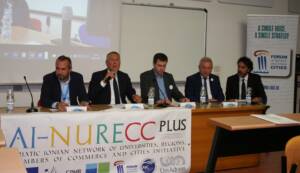
PANEL:
“An insight on the sustainable tourism European policies. Development models and best-practices from the EUSAIR Countries”:
- Valentina SUPERTI, European Commission, Directorate-General for Internal Market, Industry, Entrepreneurship and SMEs – Director of ECOSYSTEMS II: TOURISM & PROXIMITY (video-message);
- Jovo ATELJEVIC, Professor and Head at the Management Department – University of Banja Luka (Bosnia and Herzegovina);
- Milena ČUKIC, Marketing Coordinator at National Tourism Organisation of Montenegro;
- Donatella ROMOZZI e Michele GIOVENALI, Marche Region, Italian project partner of the EUSAIR Facility Point;
- Davide FRULLA, Head of EU Project management / International cooperation and Tourism Unit of the Municipality of Fano (Italy);
- Paolo SERI, Adjunct Professor of Territorial and Environmental Economics – Marche Polytechnic University (Italy).
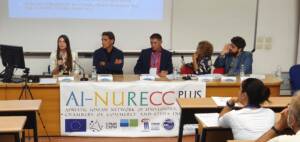
Valentina Superti (Director of tourism and proximity at European Commission, DG Grow) gave us her reflections on the thematic:
“The context is is quite challenging but every challenge comes with an opportunity: it’s a matter of fact that after each crisis Europe has always reinvented itself and has become strong. The Adriatic-Ionian Region is one of the most impacted regions by climate change with the fragile biodiversity and severe weather conditions. Many challenges, in particular those aiming at more sustainable greener tourism, can only be addressed by joining our efforts and learning from each other. The European Union will continue to support a cross-border cooperation in line with the goal of the new strategy: the new programming period 2021-2027 can be used to implement the projects for sustainable tourism under INTERREG, but also under the ESIF funds as well the IPA framework“.
The European Institutions are working for a shared European Agenda for Tourism to support the tourism ecosystem in Europe which is so important economically and which represents so many jobs. European tourism can itself lead the transformation of the tourism ecosystem with innovative ideas and concrete commitments from words to action, through a bottom up approach.
Watch the full video of her intervention: https://www.youtube.com/watch?v=RZGWkRLCzvE
Jovo ATELJEVIC, Professor and Head at the Management Department – University of Banja Luka:
Despite the problems that still are registered in the area (weakness of transportation infrastructure, lack of easily accessible data, overtourism in some areas) “Balkans is a geographic tourist destination, with diversity, natural resources, landscapes, culture, food. It has low economic development but low economic development provides a better ground for tourism development. The key areas of sustainable tourism development according to the United Nations World Tourism Organization (UNWTO) are: to develop a tourism industry in a way that does not damage resources, which is in support of conservation and biodiversity”
Balkans have registered a huge increase, during the last 70 years, in terms of tourists. In 2019, before the “zero tourism” due to the pandemic, over 12 million of arrivals were registered, almost as the number as of the population of the Balkans.

Milena ČUKIC, from National Tourism Organisation of Montenegro, presented Montenegro as example of sustainable destination:
“Montenegro has been declared as an ecological state by flow from the 1991. The main goal is to diverse tourism offer and to contribute it over the country and to extend it from the seaside to the hinterlands”. Montengro, Ms. Cukic explained, has a tourism development strategy based on:
- Inclusive tourism: strategy for the development of women entrepreneurship in Montenegro.
- Smart tourism: developing program for attracting digital nomads.
- Climate changes: in 2015, Montenegro signed an agreement to reduce carbon emissions by 30% by 2030 and has already succeeded to realize the stated goal before the defined deadline.
- Green and responsible tourism: Montenegro truly believes in the potential of rural and adventure tourism. Such an environment is the result of synergistic planning and actions of all local and national actors.
- National certification for responsible tourism: the tourists have become very demanding in terms of destination responsibility and the implementation of high hygiene and health standards.
Of course challenges are not missing: destination management at the local level must get better. And there is still so much to be done regarding the whole public awareness and services when it comes for example to reduction and management of waste.
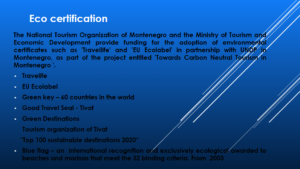
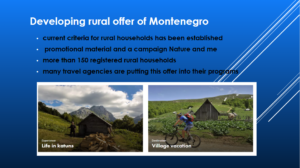
Donatella ROMOZZI e Michele GIOVENALI, Marche Region, Italian project partner of the EUSAIR Facility Point: they presented the role and the meaning of the macroregional strategies and of the Facility Point. The macroregional strategies are born by the will of the States, with the cooperation of the EU, to face the common challenges of a specific area. This area shares economic and cultural links but also problems and needs: the role of the EUSAIR strategy is to solve the problems with a common vision.
The Facility Point has the role to build a multilevel governance, to define the priority actions and to support the embedding process.
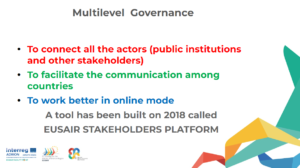
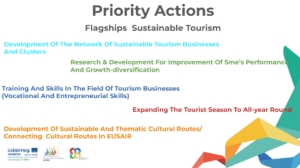
They have created a platform of stakeholders having an impact into the EUSAIR, which is called “EUSAIR Stakeholders Platform” and that you can find it here at this URL: https://www.espcommunity.eu/
“In this platform we can discuss about what are the best practices and foreign projects on sustainable tourism. You will be in contact with us and we can help you make virtual working groups, creating meetings and also helping you funding solutions“, Michele Giovenali said.
Davide FRULLA, Head of EU Project management at the Municipality of Fano (Italy) presented a project that Fano had the possibility to develop as a lead partner. The project, co-founded by the ADRION, the program of the European commission, that is dedicated to the Adriatic and Ionian macroregional area, is named “Wonder: child friendly destination“. The managing authority of the ADRION program decided to collect some input from different projects, co-founded by the program, that had some common aims, such as sustainable tourists. Wonder wanted to be a new model, a new approach for sustainable tourism, with a child friendly approach. “We started from the rights of children from a social point of view and then during the year this type of approach became some sort of attention not only to the social needs, but also to the needs of the children in terms of urban planning“.
The project involves at the local level administrator, so: politicians, restaurants, hotels, some public and private organization, that works for a cultural activity, artistic activities and put a network with them trying to offer a common added value to the people that are visiting Fano.
To discover more about the project:
https://wonder.adrioninterreg.eu/
Paolo SERI, Adjunct Professor of Territorial and Environmental Economics – Marche Polytechnic University (Italy): Cultural and Creative industries (CCIs), tourism and sustainable economic development are linked in various ways: they are a fundamental issue of positive and normative analysis for the economic development and wellbeing of Adriatic and Ionian regions. “Furthermore, beyond the function of generating occupation and wealth in the tourism sector, they have at least three other fundamental functions for the macroregion: the function of education and civilization, in that they helps building a sense of belonging to regionally shared identities; the function of regeneration of urban spaces; and finally the function of being a driver of change in individual and shared mental models“. The CCIs can definitely play a fundamental role for the achievement of EUSAIR objectives and the prosperity of the whole region.
Both sectors (CCIs and tourism) share the same problem: the lack of official and comparable data. Professor Seri proposes a “Cultural Observatory of the adriatic-ionian Macroregion“, that be very supportive for the development of sustainable cultural tourism: it could help politicians to evaluate policy and to select the best policies.
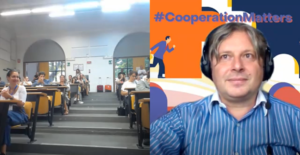
The conference was closed with the presentation of the results of the Summer School and the awarding of the students, held by Lucia PIZZICHINI, Professor at Marche Polytechnic University, Faculty of Economics – Scientific Coordinator of the Summer School, Expert on Sustainable Tourism.
During this part, Gilles KITTEL, Team Leader, European Commission – DG Regio, brought his greetings and congratulations to the students, “you are actually the people who will make changes possible and your work in the future – we hope – will contribute to those changes“. In the next months new projects dedicated to young people and students will be implemented and maybe some of them will become the next “EUSAIR Ambassadors”.

